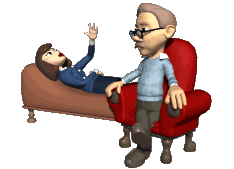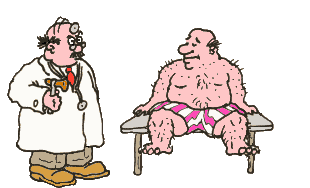- hearing voices or sounds when alone or that others do not hear
- seeing things that no one else can see
- a feeling of being touched
- smells or tastes with no reasonable explanation
 |
| from http://www.funerella.com/graphics/graveyard/albums/animated/scaryface.gif |
- Pacing
- Restlessness
- Increase social withdrawal
- Increased sleep
- Increased preoccupation with own thoughts
- Irritability
- Talking to oneself, muttering
 |
| from http://domobec.com/talking_small.gif |
- When the person is feeling relatively well, discuss with them what they find helpful and how you can work together to reduce the impact of the symptoms
- Provide comfort and reassurance
- Lower stimulation in person's environment, less people, turn off tv/radio. Remember that these are symptoms and perhaps remind the person of that
- Identify any current stressors that may have increased symptoms and help to reduce them (this could be as simple as a bus trip or a trip to a mall where being with crowds and strangers may increase stress levels, or perhaps, a personal problem or a family situation)
- If the hallucinations continue and are worrisome, call the mental health team or physician involved
- Provide distractions such as:
- activities,
- discussion,
- relaxation techniques (see section on stress management),
- chores
- competing stimuli such as television or a portable stereo (walkman or CD)

from http://www.poorwilliam.net/gif-ani/psychiatrist_listening_to_patient_lg_clr.gif
- Attempts to reason
- Attempts to debate with the voices
- Remember that hallucinations are part of illness. Avoid emotional responses. Try to empathize with the fear, anxiety, distress. Try to ensure that the person is taking their medication.
 |
| from http://www.gifanatics.com/files/-q.gif |
e.g.:
- The radio/TV is sending messages to you
- You are the Queen of England
- The RCMP are watching you, following you
- There is a plot to hurt you, etc.)
 |
| from http://www.lumison.co.uk/~magnificat/queenwave.gif |
- Fearfulness
- Suspiciousness
- Irritability
- Restlessness
- Pacing
- Preoccupation with one's thoughts
- Refusal to maintain a routine or do activities
 |
| http://www.horsemanpro.com/articles2/images210/Passage_animated.gif |
- When the person is feeling relatively well, discuss with them what they find helpful and how you can work together to reduce the impact of the symptoms
- Provide comfort and reassurance, acknowledge their distress
- Lower stimulation in the environment, less people, turn off tv/radio Remember that these are symptoms and perhaps remind the person of that
- Identify any current stressors that may have increased symptoms and help to reduce them (this could be as simple as a bus trip or a trip to a mall where being with crowds and strangers may increase stress levels, or perhaps, a personal problem or a family situation)
- Avoid attempts to reason or debate about the delusions
- Avoid colluding with the delusion or joining in on it
- Avoid interpreting the delusion
- Identify the underlying feelings such as fear or anxiety and address that with the person. Say: "This is making you feel really anxious. What can we do to help that?" Or: Offer suggestions such as doing:
- stress management techniques
- distractions such as activities, chores, music,
- talking about something else if possible
 |
| from http://i639.photobucket.com/albums/uu114/loveej/Keefers%20Images/scenery-animated.gif |
 |
| from http://images2.fanpop.com/images/photos/3800000/Animated-GIFs-flight-of-the-conchords-3809604-449-328.gif |
 |
| from http://www.gifbin.com/bin/082009/1250181970_cat_doing_the_laundry.gif |
THOUGHT DISORDER: Troubles with thinking, confusion, disorganized thoughts, racing thoughts, not enough thoughts in one's head
Signs that someone may have a thought disorder:
- Confusion
- Incoherence
- Illogicality
- Inappropriate emotional response-e.g..laugh at something sad
- Difficulty communicating so that you may have trouble following their line of thought
- Long silences while in conversation
- Anxiety
- Restlessness
- Pacing
- Irritability
 |
| from http://www.thecomedynet.com/wp-content/gallery/newimages5/laughing%20gifs.gif |
- Structure in one's day - having a daily routine
- Limits and expectations
- Using simple words, short sentences
- Ask the person to repeat instructions back to you
- Lower stimulation in the person's environment e.g. turn off tv, radio, less people
- Do not provide too many choices, simplify things
- Remember that these are symptoms
 |
| from http://amanda.dd.com.au/gallery/large/desk-calendar-animation.gif |
SUPPORTING MEDICATION REGIME
Medication is one way to reduce a person's vulnerability to stimulation. Many people are ambivalent about taking meds because of:
- Side effects
- Others want to stop as soon as they feel better as the meds are associated with being sick
- Others may lack insight and not believe they have an illness
- Medication routine may be too complicated and confusing
- The person may forget
- The person may feel well again and not understand why they need to continue to take the medication
- Some people enjoy their symptoms and miss them when they are gone
 |
| from http://www.colectiva.tv/wordpress/wp-content/uploads/2009/08/mark-portillo-2245689397_294c00ca25_o.gif |
- Education about illness is the best way to prevent a reoccurrence of symptoms. People must become experts on their own illness when possible
- Listen to relatives complaints of side effects and take them very seriously. These are real and uncomfortable and there are remedies. See the doctor.
- Discuss what the meds are for and the implications of stopping them (not as a threat but as a reminder)
- Forgetfulness: try blister packs from the pharmacy, docettes, simplified regime. Talk with the mental health worker or physician for suggestions
- Routine: Have the person take the medication at the same time everyday. Often associating taking the pills with an activity such as brushing teeth or eating a meal is helpful. Have them keep the pills in a very visible place, e.g. beside the toothpaste or on the kitchen table.
 |
| from http://www.bvsd.org/schools/mesa/about/PublishingImages/awards%20-%20animated.gif |
 |
| from http://www.gifs-paradise.com/animated_gifs/medicine/animated-gifs-medicine-042.gif |
- Injectable Meds: Available for some prescriptions. Usually given once every 2 weeks or once a month. An option to taking daily medication for some people.
 |
| from http://www.kathleens-graphics.com/Animated%20Gifs/animals/staurt%20little%20brushing%20teeth.gif |

No comments:
Post a Comment